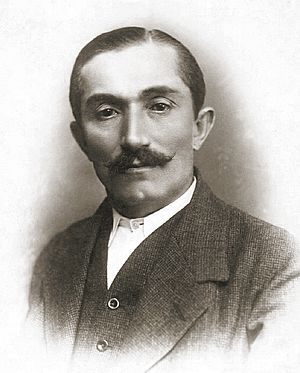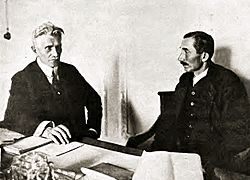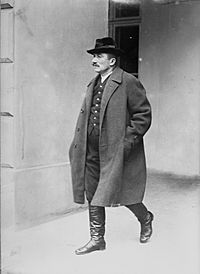Wincenty Witos facts for kids
Quick facts for kids
Wincenty Witos
|
|
|---|---|
 |
|
| 6th, 11th & 14th Prime Minister of Poland | |
| In office 10 May 1926 – 14 May 1926 |
|
| President | Stanisław Wojciechowski |
| Preceded by | Aleksander Skrzyński |
| Succeeded by | Kazimierz Bartel |
| In office 18 May 1923 – 19 December 1923 |
|
| President | Stanisław Wojciechowski |
| Deputy | Stanisław Głąbiński Wojciech Korfanty |
| Preceded by | Władysław Sikorski |
| Succeeded by | Władysław Grabski |
| In office 24 July 1920 – 19 September 1921 |
|
| President | Józef Piłsudski (Chief of State) |
| Deputy | Ignacy Daszyński |
| Preceded by | Władysław Grabski |
| Succeeded by | Antoni Ponikowski |
| Personal details | |
| Born | 22 January 1874 Wierzchosławice, then Austro-Hungary, now Poland |
| Died | 31 October 1945 (aged 71) Kraków, Poland |
| Political party | Polish People's Party "Piast" |
| Profession | Farmer |
Wincenty Witos (22 January 1874 – 31 October 1945) was an important Polish politician. He was a leader of the Polish People's Party (PSL). Witos served as the Prime Minister of Poland three times in the 1920s.
He joined the Polish People's Party in 1895. From 1913, he led its "Piast" group. He was a member of parliament in the Galician Sejm from 1908 to 1914. He also served in the Austrian parliament in Vienna from 1911 to 1918. Witos played a key role in the Polish Liquidation Committee in 1918. He was also a member of the Polish Sejm from 1919 to 1920.
Witos was Prime Minister of Poland in 1920–1921, 1923, and 1926. His third government was removed from power by a military takeover in 1926. This event was led by Józef Piłsudski. Witos became a leader of the opposition against Piłsudski's government. He helped create the People's Party. He was later put in prison and lived in exile in Czechoslovakia from 1933 to 1939. People saw him as a champion for farmers. After returning to Poland, he was imprisoned again by the Germans during World War II.
In 1941, due to poor health, the Germans allowed him to return to his home village. In 1944, he refused to make an anti-Soviet statement for the German authorities. After World War II, in 1945, he became a vice-chairman of the State National Council.
Contents
Early Life and Education
Wincenty Witos was born into a farming family in Wierzchosławice. His parents were Wojciech and Katarzyna. His family was poor and lived in a small hut. Wincenty had two brothers, Jan and Andrzej. Andrzej also became a leader in the Polish farming movement.
Wincenty started school at age ten and finished four grades. After school, he worked as a lumberjack, helping his father.
From 1895 to 1897, Wincenty served in the Austrian Army. He was stationed in cities like Tarnów and Kraków. In 1898, he married Katarzyna Trach. Their daughter, Julia, was born in 1899.
First Steps in Politics
At 19, Witos wrote his first newspaper article for Przyjaciel Ludu (meaning "Friend of the People"). In 1895, he joined the Galician Stronnictwo Ludowe (People's Party). By 1903, he was elected to the party's main committee. In 1908, he became a delegate to the Diet of Galicia in Lwow, serving until 1914.
In 1909, Witos was elected wójt (mayor) of his home village, Wierzchosławice. As mayor, he worked to improve the village's economy. He helped build a mill and a community center. He also improved roads and expanded the local school. He organized a farmers' cooperative and a credit union. He slowly became more important in the farmers' political movement.
Working for Poland's Freedom
In 1913, the People's Party split. In 1914, Witos became the vice president of the new party, Polskie Stronnictwo Ludowe "Piast". He also served as a deputy in Austria's parliament until 1918.
When World War I started in 1914, Witos became even more active in politics. His party joined the Supreme National Committee, a group working for Poles in Galicia. Witos was its vice president.
During the war, Witos stayed in touch with Polish independence activists. He supported Józef Piłsudski, seeing him as a future leader for a free Poland. In 1916, Witos became the president of "Piast." In 1917, he helped write a statement calling for an independent Poland.
On 28 September 1918, Witos helped lead the Polish Liquidation Committee. This temporary government kept order in the former Austrian part of Poland as it moved towards independence. The Committee declared Western Galicia free from Austria-Hungary. Witos was asked to join another new government but declined due to political differences.
Prime Minister of Poland
First Term (1920-1921)
Wincenty Witos first became Prime Minister of Poland in July 1920. This was a very important time for Poland, as the country was fighting the Polish–Soviet War. His government worked to unite the country and defend it. He resigned in September 1921.
Second Term (1923)
In May 1923, Witos became Prime Minister for the second time. His government was formed by an agreement between his party and right-wing parties. This agreement was called the Lanckorona Pact. They aimed to strengthen Polish identity and the role of the Catholic Church. Witos resigned from this position in December 1923.
Third Term and the May Coup (1926)
Witos became Prime Minister for the third time on 10 May 1926. However, his government faced many challenges. There was a trade war with Germany and political unrest in Poland. Józef Piłsudski believed the government was chaotic and wanted to "fix" political life.
On 12 May, Piłsudski's troops marched on Warsaw. Witos's government declared a state of emergency. Piłsudski met with President Stanisław Wojciechowski, demanding Witos's government resign. The negotiations failed. To prevent a civil war, both President Wojciechowski and Prime Minister Witos decided to resign on 14 May. They ordered their troops to stop fighting. A new government was formed, and Piłsudski gained significant power.
After Being Prime Minister
Opposition to Sanation
After leaving power in 1926, Witos remained a strong opponent of Piłsudski's "Sanation" government. In the 1928 elections, Witos was re-elected to the Sejm.
From 1929 to 1930, Witos was a leader of Centrolew (meaning "Centre-left"). This was a group of several political parties that opposed Piłsudski's government. Witos spoke at a large meeting in Krakow in June 1930, criticizing the government.
Brest Trials and Exile
In September 1930, the government arrested 20 opposition leaders, including Witos. They were accused of planning to overthrow the government. These leaders were imprisoned in the Brest Fortress, and their trial became known as the "Brest trials." The prisoners, including Witos, were treated harshly.
Witos was released on bail in November 1930. In March 1931, he helped combine three smaller farmer-based parties into the "united" People's Party.
The Brest trial began in Warsaw in October 1931. Witos and the others were accused of plotting against the government. They all said they were innocent. Witos used the trial to explain his strong criticisms of the government's actions since the 1926 coup.
In January 1932, Witos was sentenced to 1.5 years in prison. He was also not allowed to hold public office for three years. In 1933, the sentences were confirmed. To avoid going to prison, Witos and several other leaders went into exile. They moved to Czechoslovakia. They stated that they would not be held hostage by the government and would continue to fight against the "dictatorship." Witos lived in exile until 1939.
See also
 In Spanish: Wincenty Witos para niños
In Spanish: Wincenty Witos para niños
 | Shirley Ann Jackson |
 | Garett Morgan |
 | J. Ernest Wilkins Jr. |
 | Elijah McCoy |



